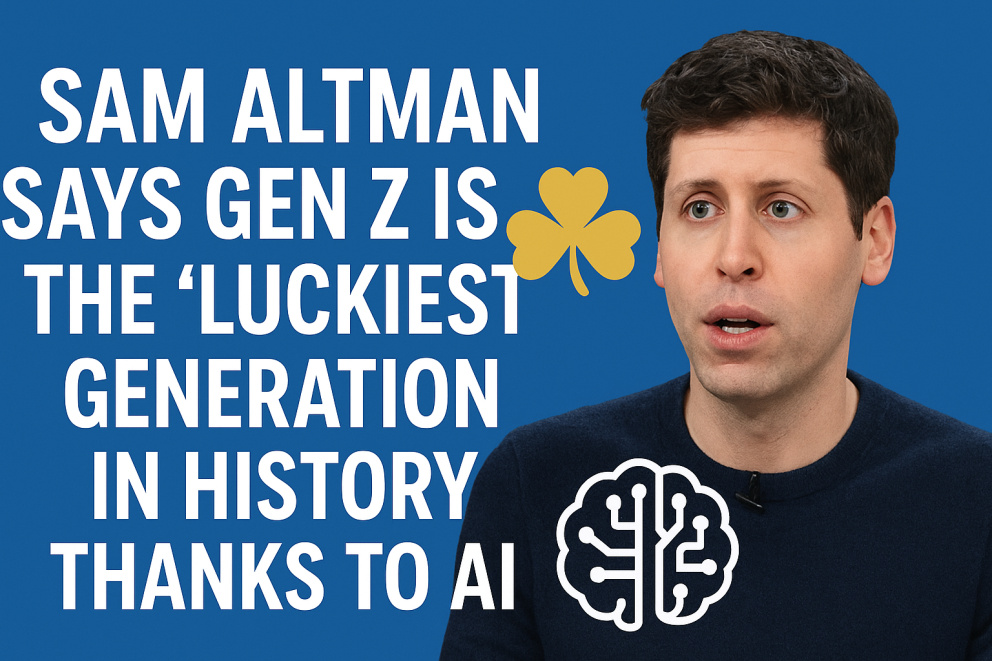Sam Altman Says Gen Z Is the Luckiest Generation in History Thanks to AI
Introduction:
A Bold Claim About Generation Z
In a recent interview, Sam Altman, CEO of OpenAI
and one of the most influential voices in artificial intelligence, made a
striking statement: ’Generation Z is the luckiest generation in
history—thanks to AI.’
This bold proclamation has sparked widespread discussion. Is
he right? Could those born between the late 1990s and early 2010s truly be the
most fortunate generation ever because of artificial intelligence?
To understand Altman’s perspective, we must examine how AI
is reshaping education, work, creativity, and global problem-solving—and why
Gen Z is uniquely positioned to benefit from this transformation.
Why Gen Z
Has an Unprecedented AI Advantage
1. Instant Access to Knowledge & Supercharged
Learning
Previous generations relied on textbooks, encyclopedias, and
slow internet searches to gather information. Today, AI-powered tools
like ChatGPT, Google Gemini, and Microsoft Copilot act
as instant tutors, research assistants, and brainstorming partners.
- Students can
get step-by-step explanations for complex math problems, debug code in
seconds, or receive feedback on essays.
- Self-learners can
master new skills through AI-curated courses and personalized learning
paths.
- Language
learners can practice real-time conversations with AI chatbots
instead of waiting for a tutor.
A 2023 study by Stanford University found that students
using AI tutoring tools performed 20% better on exams than those
relying solely on traditional study methods.
2. The AI Job Boom: New Careers & Economic
Opportunities
While some fear AI will eliminate jobs, history shows that
technological revolutions create more opportunities than they destroy. Gen
Z is entering the workforce just as AI is birthing entirely new industries,
including:
- AI
Engineering & Prompt Engineering (crafting precise AI
instructions)
- AI
Ethics & Policy (ensuring responsible AI development)
- AI-Augmented
Healthcare (personalized medicine, diagnostics)
- Creative
AI Collaboration (AI-assisted filmmaking, music, and design)
According to the World Economic Forum, AI will
create 97 million new jobs by 2025, many of which will favor digitally
native Gen Z workers.
3. Solving Humanity’s Biggest Problems Faster
Gen Z is inheriting a world with urgent challenges—climate
change, disease, food shortages, and energy crises. AI is accelerating
solutions in ways that were once unimaginable:
- Climate
Tech: AI optimizes renewable energy grids and predicts extreme
weather patterns.
- Healthcare: AI
models like AlphaFold (DeepMind) are decoding protein structures to speed
up drug discovery.
- Agriculture: AI-driven
precision farming boosts crop yields while reducing water waste.
Unlike previous generations, Gen Z won’t have to wait
decades for breakthroughs—AI is compressing innovation cycles from years to
months.
4. More Free Time & Creative Freedom
For decades, the standard workweek was 40+ hours of
repetitive tasks. AI automation is changing that:
- AI
handles administrative work, freeing up time for strategic thinking.
- Generative
AI assists with content creation, allowing more focus on big ideas.
- Remote
work + AI tools enable flexible lifestyles—imagine a 4-day workweek
becoming the norm.
A 2024 McKinsey report predicts that AI could reduce
mundane tasks by 50%, giving Gen Z more time for passion projects,
entrepreneurship, and personal growth.
Potential
Challenges & Risks for Gen Z
While AI presents incredible opportunities, it also brings
challenges:
1. Job Market Disruption
- Some
traditional roles (e.g., data entry, customer service) will decline.
- Workers
must continuously upskill to stay relevant.
2. Misinformation & Deepfakes
- AI-generated
fake news and hyper-realistic deepfakes could erode trust in media.
- Gen
Z will need strong digital literacy to navigate this
landscape.
3. Ethical Dilemmas
- AI
bias in hiring, lending, and law enforcement remains a concern.
- Privacy
issues arise as AI analyzes vast amounts of personal data.
However, experts argue that Gen Z is uniquely
equipped to handle these challenges—having grown up with technology, they
are more adaptable and skeptical of online content than older generations.
How Gen Z
Can Maximize the AI Opportunity
To truly become the ’luckiest generation,’ Gen Z must:
1. Embrace Lifelong Learning
- AI
evolves rapidly—continuous learning is essential.
- Platforms
like Coursera, Udacity, and Khan Academy offer AI-focused
courses.
2. Develop ’Human-Only’ Skills
- Creativity,
emotional intelligence, and critical thinking will be more
valuable than ever.
- AI
can’t replace human judgment in leadership, ethics, or innovation.
3. Advocate for Responsible AI
- Push
for transparency, fairness, and regulations in AI
development.
- Support
initiatives like the EU AI Act and OpenAI’s safety guidelines.
Conclusion:
A Golden Age Powered by AI?
Sam Altman’s statement isn’t just hype—it’s a recognition
that Gen Z is arriving at the perfect moment in history. They
have the tools to learn faster, work smarter, and solve global problems at an
unprecedented pace.
However, luck alone isn’t enough. The true
advantage lies in how Gen Z harnesses AI—responsibly and creatively—to shape a
better future.









